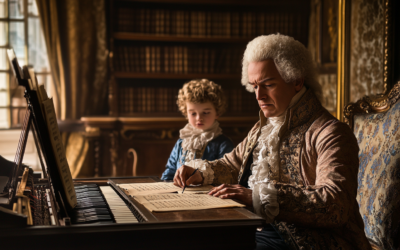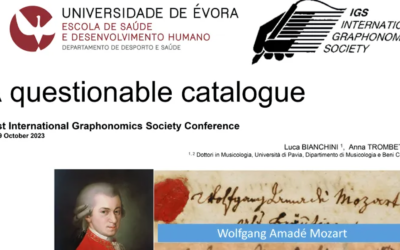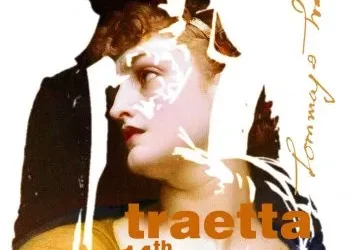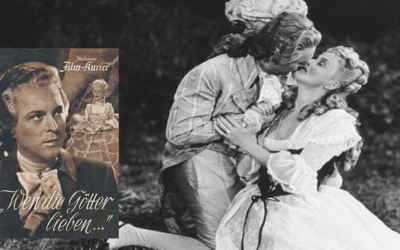The Fabrication of Genius
Leopold Mozart’s Manipulative Legacy
Leopold Mozart’s tireless efforts to promote his son Wolfgang as a child prodigy were rooted in manipulation, exaggeration, and a relentless drive for social success. Far from being a miraculous genius, Wolfgang was pushed into the spotlight by his father, whose grandiose claims often obscured the reality of his son’s abilities.
Mozart: The Fall of the Gods
This book offers a fresh and critical look at the life of Wolfgang Amadeus Mozart, challenging the myths that have surrounded him for centuries. We strip away the romanticised image of the “natural genius” and delve into the contradictions within Mozart’s extensive biographies. Backed by nearly 2,000 meticulously sourced citations, this work invites readers to explore a deeper, more complex understanding of Mozart. Perfect for those who wish to question the traditional narrative, this biography is a must-read for serious music lovers and historians.
"Each and every person in Vienna said that little Mozart was not capable of composing the opera; or that he had produced such a poor subject that it could not be staged; or that the music was not written by him, but by his father."
Mozart: The Fall of the Gods
The myth of Mozart’s genius has long been accepted without question, but the truth reveals a much more complicated—and orchestrated—story. Key to this fabrication was none other than his father, Leopold Mozart, whose ambitions for his children’s success led him to manipulate not only their reputations but also historical records. Letters from 1756 to 1762 mysteriously disappeared, and those from 1762, 1767, and 1768 were carefully recopied and then destroyed. These crucial years, when Leopold supposedly “discovered” the talents of his children, were rewritten by the father himself. Leopold decided to abandon his own composing career to focus on exploiting his children’s talents, crafting a story of precocious genius that served his ambitions.
Leopold was known for his arrogance, and his ruthless tactics earned him enemies throughout his life. He never hesitated to showcase Wolfgang’s abilities in the most manipulative ways, often inserting his son into other musicians’ concerts, embarrassing rivals, and creating tension. His son, in turn, absorbed these tactics, continuing the pattern of arrogance and unpopularity.
In a 1768 letter to Lorenz Hagenauer, Leopold referred to Wolfgang as “the miracle that God gave to Salzburg.” This phrase has since been endlessly quoted by sources like Wikipedia to support the narrative of Mozart’s early genius, yet the context is often conveniently ignored. Leopold’s statement wasn’t made to celebrate an undisputed fact, but rather to defend his son from a growing public perception that he was a fraud. At the time, many in Vienna believed that Wolfgang hadn’t composed his works and that Leopold was the real author of his music.
It wasn’t just the public who had doubts. Empress Maria Theresa famously wrote to her son, Archduke Ferdinand, advising him against hiring Mozart, calling him and others like him “useless people” who discredit the nobility by wandering the world like beggars. This damning judgment ensured that Leopold’s hopes of securing a position for his son in Milan were dashed. The same skepticism followed them in Vienna, where people whispered that the young Mozart was incapable of writing the opera attributed to him.
Leopold’s relentless self-promotion and his efforts to inflate his son’s abilities contributed to their downfalls as much as to their successes. The glowing praise Leopold lavished upon himself and his children often rang false, and many began to see through the facade. It was no secret that Leopold sought not only his children’s success but also his own validation and social advancement through their achievements. His efforts to manipulate public opinion were transparent to many, as his desperation to prove Wolfgang’s genius grew more pronounced.
One of the most telling examples of this charade is found in the infamous test arranged by Leopold to prove that Wolfgang, and not Leopold, had composed the music. According to Leopold, in front of notable figures like the poet Metastasio and composer Hasse, Wolfgang was tasked with composing an aria on the spot. Despite Leopold’s claims that his son performed the task effortlessly, none of the witnesses left any record of this supposed triumph. Hasse, in fact, later expressed doubts about Wolfgang’s abilities, even suggesting that if Leopold didn’t stop pampering and praising his son excessively, Wolfgang might never live up to the inflated image his father had created.
You May Also Like
K.143: A Recitative and Aria in the Shadows of Doubt
K.143 is a prime example of how Mozart scholarship has turned uncertainty into myth. With no definitive evidence of authorship, date, or purpose, this uninspired recitative and aria in G major likely originated elsewhere. Is it time to admit this is not Mozart’s work at all?
The Enigma of Mozart’s Symphony K.73
The Symphony in C Major K.73 has long puzzled Mozart scholars. Touted as a youthful work of prodigious talent, its origins are murky at best. The title “Symphony,” inscribed on the first page of the autograph, is devoid of the composer’s name, casting immediate doubt on its attribution to Wolfgang Amadeus Mozart. Was this truly his work, or is the Symphony yet another victim of overzealous attribution?
Mozart’s Thematic Catalogue Exposed as a Forgery
A groundbreaking forensic analysis reveals that Mozart’s thematic catalogue, long thought to be his own work, is a posthumous forgery. This discovery, detailed in Mozart: The Construction of a Genius, turns centuries of Mozart scholarship on its head, demanding a re-examination of his legacy.
Bologna Connections
Quirino Gasparini’s rediscovered Mitridate aria takes centre stage in Bern and Basel, shedding light on Mozart’s reliance on this forgotten composer.
International Traetta Award
We are thrilled to announce that the 14th International Traetta Award has been bestowed upon Anna Trombetta and Luca Bianchini. This prestigious recognition honours their outstanding dedication to musicological research on primary sources of the European musical repertoire, offering significant contributions to reshaping the historiography of 18th-century music.
A Legacy Rewritten by the Shadows of History
Mozart’s image, often regarded as a universal symbol of musical genius, was heavily manipulated by the Nazi regime, a fact largely ignored in post-war efforts to “denazify” German culture. From propaganda-driven films to anti-Semitic narratives, Mozart’s legacy is far more complex and troubling than we are often led to believe.







